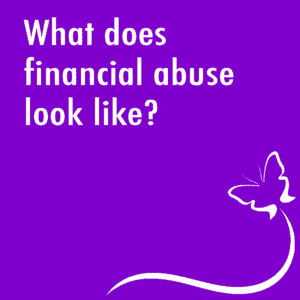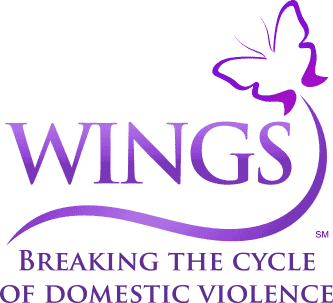The Number One-Way Abusers Control: Financial Abuse
- Posted by Sarah Swiston
- On March 31, 2021
- chicago metropolitan area, Chicago suburbs, COVID-19, Domestic Violence, domestic violence agency, domestic violence organization, DV agency, economic abuse, Financial Abuse, Money Management, northwest chicago, reasons they stay, WINGS, WINGS Program
Financial abuse is the number one reason someone may not be able to leave or may force them to return to an abusive situation. Research has shown up to 99% of all domestic violence cases involve financial abuse. Read about what financial abuse looks like, how it complicates survivors leaving, economic impacts and how WINGS assists these survivors.
Financial abuse occurs when one partner limits access to financial assets in order to control the other partner. Without access to financial resources, the survivor’s options for separating may seem insurmountable.
COVID-19 and the uncertain economy has exacerbated financial abuse. In addition to increased exposure to abusers, survivors looking to break free financially often face unemployment, underemployment, food insecurity, housing instability and more.

Power and Control – Examples of Financial Abuse
Financial abuse can be a slow and debilitating form of domestic violence, since it typically occurs over a period of time. By having limited funds, a person may become more reliant or dependent on their partner, which makes it more difficult for the individual to separate from the abuser.
Examples of financial abuse include:
-
Preventing the survivor from getting a job.
An abuser can limit or deny a partner from working or furthering their education. Leaving an abusive partner may seem unimaginable if they do not have the skill set or work history to find a job after leaving an abusive relationship.
-
Sabotaging work or employment opportunities.
Some abusers have become jealous of their partner spending time at work with colleagues and have done malicious actions to get the survivor fired. Examples include calling or showing up to their employer repeatedly.
-
Making their partner ask for money or giving them an allowance.
-
Taking their partner’s money or benefits.
Some abusers may refuse to work themselves, but handle all of the finances for the household.
Another example may look like an abuser forcing their partner to work for a family business without pay. Other abusers may threaten their partners to turn over their public benefits or they will report them for cheating or misusing the benefits.
-
Not involving or allowing their partner to have access to the household bank accounts or finances.
For example, one of the survivors WINGS served was working full-time, but was obligated to turn over her paycheck to her abuser. She was given an allowance and never knew how much money the family was making.
-
Damaging their partner’s credit by running up debt in their name or on joint accounts.
Abusers have forced their partners to take out credit cards or sign a lease in their own name. The abusers then max out the card or fail to pay rent leading to bad credit and/or evictions.
-
Hiding assets.
-
Force their partner to agree to power of attorney which allows them to legally sign documents without the partner’s consent.
Not commonly thought of as domestic abuse, this type of financial abuse can happen when an older child is caring for an aging parent. Financial exploitation accounts for the highest percentages of abuse reported to the Illinois Department on Aging’s Adult Protective Services Program.
-
Withholding funds from the victim so they cannot obtain basic needs like food or medicine.
A WINGS staff shared that one of her clients had encountered this form of financial abuse when the abuser did not allow her to purchase personal hygiene products because the abuser didn’t feel they were necessary.
-
Evading child support payments or drawing out divorce process.
The Challenges of Leaving
Financial abuse creates both short and long-term challenges for survivors.
With limited assets, survivors fear homelessness, having the ability to provide for their children and losing their children through legal struggles. Abusive partners often use the fact that they make more money than their partner in custody cases to try to sway the outcome in their favor.
Long-term challenges include damaged credit scores, limited housing options if they have faced eviction, sporadic employment and legal issues.
Megan, WINGS Supervisor of Clinical Services says, “I think people are quick to judge others as being lazy or lacking motivation. Financial abuse is related to emotional abuse. Often a victim has been made to feel that they are worthless or stupid or no good and consequently they struggle to find the strength to ask for help or achieve independence.”
The Economic Cost of Domestic Violence
 Not only does domestic violence and financial abuse affect the family, but it has societal economic impacts as well. An advocacy group, Legal Momentum, reports that victims of domestic violence lose an average of 137 hours of work and the equivalent of 32,000 full-time jobs each year.
Not only does domestic violence and financial abuse affect the family, but it has societal economic impacts as well. An advocacy group, Legal Momentum, reports that victims of domestic violence lose an average of 137 hours of work and the equivalent of 32,000 full-time jobs each year.
Another study of intimate partner violence in the U.S. estimated $5.8 billion cost to society, factoring in health costs and productivity losses. These numbers are pre-pandemic. As calls to domestic violence hotlines have increased, the actual cost may be greater now.
Help is Available!
 While this information can be harrowing, there is help available. WINGS provides holistic, trauma-informed services to survivors of domestic violence.
While this information can be harrowing, there is help available. WINGS provides holistic, trauma-informed services to survivors of domestic violence.
Financial abuse is abuse. If you find yourself in a financially abusive situation, call WINGS Hotline: 1-847-221-5680.
WINGS has helped survivors suffering from financial abuse with:
- Educational programs with reduced costs: GED programs or obtaining certifications
- Linking clients to job agencies
- Assisting clients with career services
- Money Management Educational Programs – Learn more here.
- Rental assistance or transitional housing programs – Learn more here.
- Affordable childcare services
- Assistance in receiving eligible benefits. With several of WINGS clients losing their jobs during the COVID-19 pandemic, WINGS Family Advocates have helped survivors file for unemployment and/or receive assistance through grants to cover bills and other needs. – Learn more about COVID-19 impacts on domestic violence here.
Learn more about what a journey with WINGS could look like. http://wingsprogram.com/journey-with-wings/
Learn more about WINGS Counseling and Mentoring programs here: http://wingsprogram.com/counseling-planning/
Financial Freedom
“…It has been about eight months now in WINGS Transitional Housing, and it has single-handedly opened the door to a lifestyle where the children and I are thriving.
Since moving in, I went from working three different jobs to my one dream job…It’s like anything is possible, which is a full 180 from believing I was trapped and couldn’t do anything about it.” ~Samantha, a WINGS Program Participant
“A client came from shelter into the WINGS Transitional Housing program with a full-time job, but no savings.
She took Money Management classes last quarter and completed monthly budgets with me, her assigned WINGS Family Advocate.
The client started working towards a strategy of slowly building savings and lowering monthly expenses.
Months into the program, she has tremendously lowered monthly expenses and has almost reached her savings goal too,” Dara, WINGS Family Advocate




0 Comments